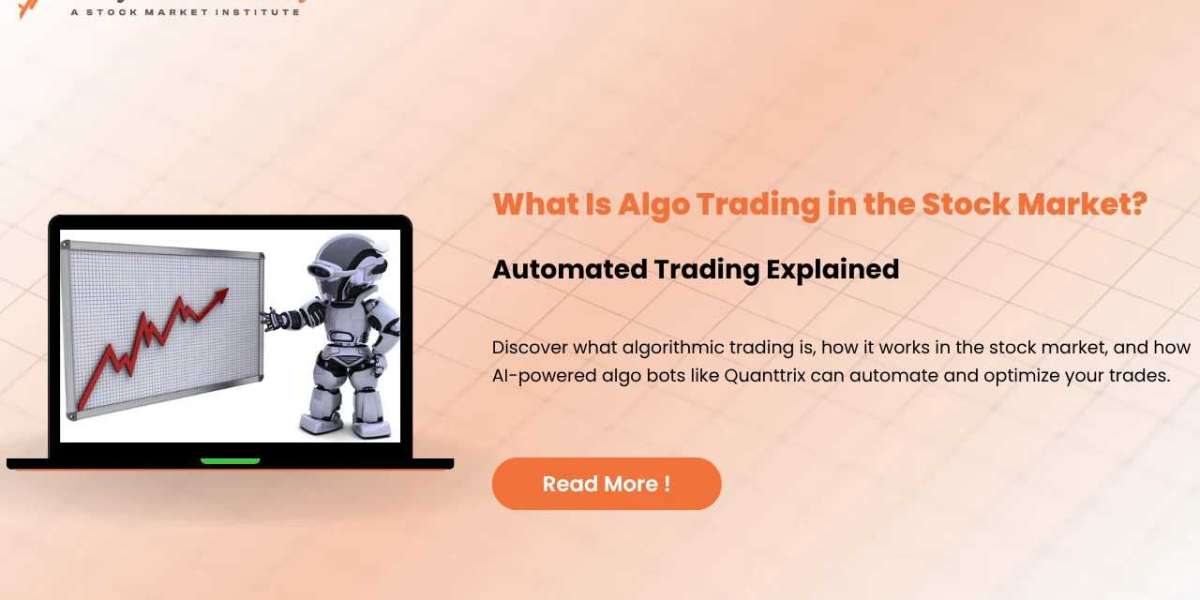What is Algo Trading in Stock Market?
Introduction
Ever wondered how stock prices move in the blink of an eye, or how trades are placed faster than any human possibly could? Welcome to the world of Algo Trading —short for Algorithmic Trading. If you're picturing robots with suits and briefcases, don't worry—it's not quite that sci-fi. But it is an exciting and increasingly common way that people and institutions trade stocks using automation and logic.
In this article, we'll break down what algo trading really means, how it works, and how you can get started with it—even if you're not a coding wizard. Whether you're curious about smart trading, considering a technical analysis course online , or aiming to learn through a share market technical analysis course , this is your one-stop beginner's guide.
Discover what is algo trading in stock market and learn how to do algo trading, take a technical analysis course online, or a share market technical analysis course.
What is Algo Trading?
Algo Trading , or algorithmic trading, is like teaching a computer how to trade stocks for you using a set of rules. Imagine giving your computer a recipe: “Buy this stock if the price falls by 3% in one hour, and sell if it rises by 5%.” The computer then watches the market, and as soon as the conditions match your recipe, it trades—without you lifting a finger.
In simple words, it's automated trading based on logic and data, not gut feeling.
Why is Algo Trading Becoming Popular?
Why do people use algo trading? Because it's fast , accurate , and emotion-free . Unlike human traders, computers don't panic or get greedy. They just follow the rules. It's like having a super-disciplined trader working 24/7.
Plus, with increasing access to high-speed internet and free data, more people can now participate in algo trading—no longer limited to big financial institutions.
How Does Algo Trading Work?
At its core, algo trading uses:
- A set of instructions (algorithm) to follow.
- Market data such as price, volume, and time.
- Trading platforms that execute the orders.
The process goes like this:
- You create a strategy.
- You convert that strategy into an algorithm.
- The computer watches the market.
- The algorithm triggers trades based on your conditions.
Let's say you want to trade based on moving averages—a common strategy. Your algorithm could say: “Buy when the 20-day moving average crosses above the 50-day moving average.” Once this happens, it will automatically buy.
Real Life Example of Algo Trading
Let's say you're trading the stock of XYZ Ltd. You notice that whenever its price goes up by 2% in the first hour of trading, it often continues rising by another 3% before noon.
So, you write a simple algo:
- If XYZ goes up 2% between 9:15 and 10:15 AM , buy.
- Sell when profit reaches 3%.
Once coded and activated, your algo watches the stock like a hawk and makes the move for you—without emotions or distractions.
Advantages of Algo Trading
Here's why algo trading rocks:
- Speed: Executes trades in milliseconds.
- Discipline: No emotional decision-making.
- Backtesting: Test strategies on historical data before using real money.
- Multitasking: Can monitor multiple stocks at once.
- Consistency: Sticks to the plan, no matter what.
Disadvantages You Should Know
But wait—it's not all rainbows.
- Technical Glitches: One bug can cause big losses.
- Over-optimization: Testing too much can make it work on past data only.
- Market Risks: If the strategy is poor, losses will still occur.
- Connectivity Issues: Internet drops? Your trades might be affected.
Always know the risks before diving in.
Common Algo Trading Strategies
Here are some beginner-friendly strategies used in algo trading:
- Trend: Following based on moving averages or price breakouts.
- Arbitrage: Exploiting price differences between markets.
- Mean Reversion: Betting prices will return to their average.
- Momentum Trading: Riding the wave of strong price movement.
- Market Making: Placing buy and sell orders simultaneously.
Each strategy has its pros and cons. Choose what fits your goals and risk tolerance.
Tools Platforms Used in Algo Trading
Some popular platforms for algo trading include:
- Quanttrix
- TradingView with Pine Script
- Amibroker
- MetaTrader
- Interactive Brokers
You don't always need to be a programmer. Some platforms offer drag-and-drop interfaces or ready-made strategies.
Who Can Do Algo Trading?
You might think algo trading is only for tech geeks or finance pros. Not true!
- Beginners can use pre-built strategies.
- Retail traders can automate simple trades.
- Students can learn via simulation platforms.
- Professionals can scale their strategies for consistent returns.
If you're willing to learn and stay disciplined, anyone can get started.
How to Do Algo Trading – Step-by-Step Guide
Here's a simplified path to start:
- Learn the Basics: Understand market movements and trading logic.
- Choose a Strategy: Like moving averages or breakout trades.
- Pick a Platform: Start with beginner-friendly ones like Streak or TradingView.
- Backtest Your Strategy: Use past data to check performance.
- Paper Trade First: Trade with virtual money to test it live.
- Start Small: Invest little real money at first.
- Monitor and Adjust: Keep tweaking your strategy.
Consistency and patience are key!
Importance of Technical Analysis
Technical analysis is like reading the heartbeat of the stock market. It helps you:
- Understand price patterns
- Identify support and resistance levels
- Predict future movements
If you plan to do algo trading, technical analysis is your best friend. Your algorithm will likely use charts, indicators, or patterns based on technical analysis.
Best Technical Analysis Course Online
If you're serious about mastering algo trading, consider enrolling in a technical analysis course online . These courses teach you:
- Candlestick patterns
- Chart analysis
- Indicators like RSI, MACD, Bollinger Bands
- Risk management
- Strategy development
Popular platforms include Udemy, Zerodha Varsity, and Coursera. Look for courses with real examples, not just theory.
Why Take a Share Market Technical Analysis Course
A share market technical analysis course goes beyond basic charting. It helps you:
- Build confidence in your trading decisions
- Identify low-risk entry and exit points
- Develop custom trading strategies
- Learn from industry experts
Whether you want to trade manually or automatically with algo trading, these skills are essential.
Risk Management in Algo Trading
Even the smartest algorithm can't guarantee profits. That's where risk management steps in:
- Set stop loss to limit losses.
- Use position sizing to control trade volume.
- Diversify across stocks or strategies.
- Avoid over-leveraging.
Think of it like wearing a seatbelt—you hope you don't need it, but you're glad it's there.
Final Thoughts: Is Algo Trading for You?
So, should you try algo trading?
If you love logic, hate emotional decision-making, and want to scale your stock trading with smart systems, the answer might be yes. Start small, learn steadily, and stay humble. Like gardening, algo trading needs planning, patience, and care—but the fruits can be worth it.
FAQs
Can I do algo trading without knowing how to code? Yes! Platforms like Quanttrix or Tradetron allow you to build strategies without writing a single line of code.
What's the minimum capital required for algo trading? You can start with as little as ₹5,000–₹10,000 in India, though more capital gives you better flexibility and strategy options.
Is algo trading legal in India? Absolutely. It's fully legal and regulated by SEBI. But you must use authorized brokers and platforms.
Do I need a special license or registration? Retail traders don't need a special license. But if you're offering algo strategies to others, registration may be required.
Which is better: manual or algo trading? It depends on your personality. If you're analytical and want automation, go for algo trading. If you enjoy hands-on decision-making, manual trading might suit you better.








